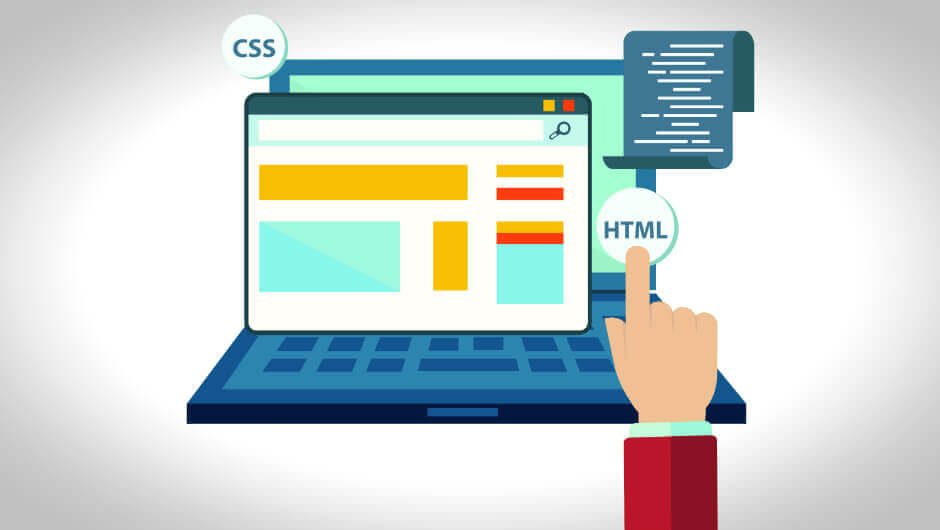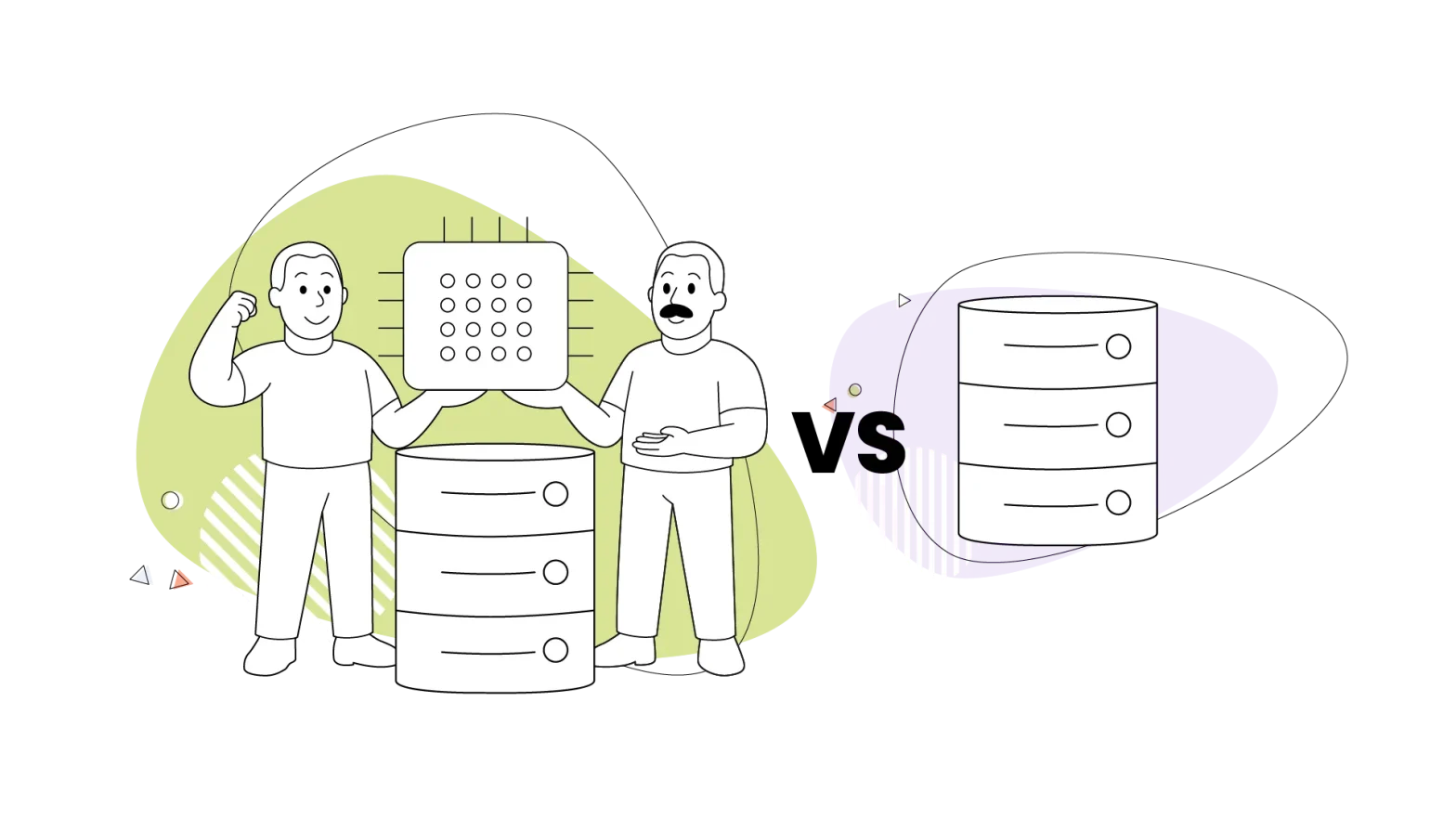Getting a website online can be a complex process, and much of the work, functionality, and final design hinge on the type of web hosting you choose and the technology (web servers) used by the provider.
Technically, you don’t need a hosting provider to host a website. Any computer can act as a web server. But setting up a server is complicated, and there’s a lot to account for.
That’s why most small businesses now work with web hosting providers, like HostPapa, who use dedicated machines capable of offering the best performance and highest security possible.
At a glance, many web hosts may seem to offer similar services with slight variations in price. But look closer, and you’ll see significant differences. Not all hosting providers offer the same levels of service, storage, features, stability, protection, and scalability.
Each of those can have a significant impact on business. For example:
- A 1-second delay in page load time causes a 7% reduction in conversions
- A 4-second delay in page load time results in a loss of 10% or more of site traffic
- 86% of websites have at least one serious security vulnerability
- Migrating to another host can cost thousands of dollars and take weeks, even months, of planning
Choosing the right web host is critical in protecting the scalability and revenue of your business.
In this article, we’ll cover everything you need to know about web hosting to make confident, informed decisions when choosing the web host for your next website.
- Define Your Goals and Hosting Needs
- Hosting Plans to Choose From
- What Ιs Shared Hosting
- Understanding Functionality to Choose the Right Web Hosting Company
- Scalability
- Host and Server Reliability
- Assess the Security of a Web Hosting Provider
- Review the Customer Service and Support Offered by a Hosting Company
- Common Mistakes to Avoid When Choosing a Web Hosting Provider

Define Your Goals and Hosting Needs
Before you can select a web hosting company, you need to identify your hosting needs and your business’s goals in the coming months/years.
Consider long-term goals because while you may not have a high-traffic website as a startup, a significant level of growth could force you into a costly migration to maintain service levels.
To determine your hosting needs and the type of servers, services, and site architecture you’ll require, ask yourself the following questions:
- What kind of website are you building – will it be primarily a source of company information, or will it require more interactive elements?
- What functionality will your site include – will you have a customer database, and will there be a transfer of private and secure information?
- What kind of traffic growth is expected – will it be a blog that sees steadily growing traffic over time or an eCommerce site that can experience intense traffic spikes?
- Will you need to host multiple websites at multiple subdomains for your site?
- Do you plan to scale up and add new functionality as the business grows?
- Will you require software integration now or in the future with 3rd party software (think accounting software, customer relationship management software, ERP, etc.)
- Do you anticipate any special coding needs for your site (PHP, java, .net, etc.)?
- What kind of content is being served – will you need a significant amount of reliable bandwidth for an ever-growing audience?
- How many pages will your site have – some providers limit the number of pages permitted with value/economic hosting plans.
- Is your site critical to the success and growth of your business – how will downtime impact your revenue? Is uptime a critical factor?
- Will you need email hosting with your site? – An email address with your domain name adds a professional touch, so put it high on your list of things!
Take the time to answer these questions while noting your future technical and growth requirements. That makes it far easier to determine the features you need and the ideal hosting plans for your site.

Hosting Plans to Choose From
Web hosting companies typically offer one or more different types of hosting plans.
Based on the technology or servers they operate and the scale of the infrastructure, web hosting companies often consider the end user who will use them.
Generally, we have:
- Shared web hosting is the most affordable option, often with plenty of server resources.
- Dedicated web hosting offers better performance, security, and control.
- Do-It-For-Me service, which includes a website made by professional web designers.
- Optimized WordPress hosting, specifically designed for the WordPress ecosystem.
- Managed web hosting, which took away all the technical hurdles and left the management aspect on the web host.
- Cloud hosting takes web hosting to another level by splitting the hosting space into multiple servers, albeit at an even bigger cost.
For example, some of the world’s largest web hosts provide complex dedicated servers and private hosting plans geared toward massive enterprises with expansive website needs.
The benefit of this level of website hosting is the servers aren’t shared with anyone, so activity and traffic to other sites will never impact your own performance. That means performance is predictable and consistent.
The downside to this level of hosting is that the cost of dedicated hosting and server rental quickly exceed the cost of hardware purchases, especially for larger enterprise sites that require more storage space and/or memory. There are significant upfront costs with this level of hosting, and you’ll need a much higher level of technical knowledge.For startups and small to mid-sized businesses, shared web hosting is the most popular and commonly chosen hosting plan.
What Is Shared Hosting?
With shared hosting, your website shares a server with several other websites, securely isolated in their own sectors of the server. All the software resources and server hardware are shared among the sites hosted on that same server.
The Benefits of Shared Hosting
Since the hosting provider fully maintains shared servers, and all you have, as the customer, is the monthly hosting fee, there are quite a few benefits to setting up and running your website on a shared hosting plan.
Shared hosting is affordable
Because the server resources are shared among customers, shared hosting is the most cost-effective and affordable hosting plan. Startups and growing businesses can get a new site online with minimal expense.
Shared hosting is easy to manage
Shared hosting plans offer access to a standard control panel that makes it easy to manage all aspects of your hosting account, from files to email accounts, sub-domains, and more. The rest, from hardware maintenance to software and operating systems, is all managed by your hosting provider, so you have worry-free hosting.
Shared hosting offers simple integration
Hosting providers using an administrative control panel like cPanel include features like one-click install for popular software integrations. If you plan to use a content management system like WordPress, a single click will install WordPress in your hosting account and have it ready for customization.
Shared hosting is scalable
While shared hosting is ideal for smaller websites and new site launches, the nature of the service makes it an ideal option for scaling and growth.
As traffic volume and the need for more resources increases, your website can upgrade to the next tier in shared hosting. This allows you to draw more bandwidth and storage without worrying about migrating your website to another service or web hosting provider to meet business needs.
The most scalable hosting providers offer virtual private servers (VPS) and shared hosting options. So, when your business finally reaches that point where you’re outgrowing a shared hosting plan, you’ve got another alternative to move to without finding a new hosting provider.
VPS is a step up from a shared server that offers some key benefits you don’t get with traditional shared hosting, mainly better performance guarantees since it’s dedicated hosting, better site security since you have a dedicated environment and more control at a root access level.
Even though virtual private servers still exist on shared servers specifically for VPS accounts, each VPS has its own dedicated, allocated resources, and the performance of one will never impact the performance of another.
While this may not be the best hosting plan for a startup, that ultimately depends on your business goals.
Overall, VPS hosting is a great balance of price, performance, security, and privacy if a business needs it.
What Is Dedicated Server Hosting?
With dedicated server hosting, your website runs on its own physical server—completely isolated from other customers. Unlike shared or VPS hosting, no resources are split or shared. All the server’s CPU, memory, bandwidth, and storage are allocated solely to your website or application.
Dedicated servers are the highest tier of hosting, offering full control, enterprise-grade performance, and enhanced security. They’re ideal for large businesses, resource-intensive applications, high-traffic websites, or platforms that require custom server configurations.
The Benefits of Dedicated Hosting
Dedicated hosting delivers peak performance
Since your site is the only tenant on the server, there are no “noisy neighbors” to affect performance. This makes dedicated hosting ideal for sites with high volumes of traffic, complex databases, or applications that need maximum speed and power.
Dedicated hosting offers ultimate control
Unlike shared or VPS environments, dedicated servers give you root-level access. This means you can install custom software, fine-tune server settings, and control every aspect of your server environment. This flexibility is perfect for developers or businesses with specialized needs.
Dedicated hosting provides advanced security
Security-conscious businesses benefit from the isolated environment of a dedicated server. You’re not at risk from vulnerabilities in neighboring accounts, and you can configure your own firewalls, DDoS protection, and security protocols. This is especially critical for handling sensitive customer data or meeting compliance standards like HIPAA or PCI-DSS.
Dedicated hosting scales with enterprise needs
While not as instantly scalable as cloud or VPS solutions, dedicated servers can be upgraded with additional hardware, more storage, and higher bandwidth as needed. Many hosting providers also offer load balancing or hybrid cloud options to help you scale without sacrificing performance.
Is Dedicated Hosting Right for You?
Dedicated servers are a serious investment, both in cost and management responsibility. They’re best suited for businesses with in-house IT teams or administrators who need specific server configurations or must maintain stringent performance and security standards.
If you’ve outgrown VPS hosting or you’re launching a major online platform with complex infrastructure, dedicated hosting could be the ideal next step.

Understanding Functionality to Choose the Right Web Hosting Company
When choosing a hosting plan, you’ll want to review the functionality and features offered by a web host, often in tiered plans, to ensure the features you need are available. Here are some of the most common functionalities you can expect with most hosting plans.
eCommerce Options
eCommerce isn’t a critical feature unless you plan on selling products, be they virtual/digital products available for download or physical products that you’ll sell online and ship to customers (or allow them to pick up at your store or facility).
Good eCommerce integration includes more than just the ability to sell products; it should include managing multiple payment options, automatic taxes, shipping management options, and secure processing and encryption of customer data.
Email Options
Email is essential to any business, especially those intent on growing a significant online presence.
Choose a shared hosting platform that gives you control over your email while also providing scalable options to pick up email enhancements and add more users as your company grows.
For assessing email options, pay attention to the number of email accounts or user accounts you can create, the cost per additional user, webmail access, email storage and archive storage, email aliases, and limitations on file attachments.
The Control Panel
Hosting providers don’t typically program their own backend/administrative areas. Instead, they use existing software platforms that allow customers to manage the various aspects and features of their hosting accounts.
The benefit to these interfaces is that most are designed to be user-friendly, making it easy to adjust things like email and FTP or manage databases and applications through a single user interface.
cPanel and Plesk are two of the most commonly used control panels in web hosting, and the learning curve isn’t steep at all, so even if you’re not tech-savvy, it won’t take long to learn your way around.
Supported Scripting Languages
Websites and custom functionality are all done using scripting languages, and there are plenty of choices outside the norm (HTML5) that most people recognize.
The type of scripting language supported will vary depending on the operating systems or server types a hosting company uses.
For example, a Windows-based hosting might support ASP, Active PERL, PHP, Python, SSI, Apache Tomcat, and others.
Linux-based hosting might support the same or similar languages, like PHP, but may not support JAVA, ASP, or JSP or specific components related to Windows.
Determine the language your site will be built with and verify that your web host supports the language.

Website Builders
Building a website once your hosting account is configured is no small feat.
Hiring a costly designer to build something from scratch might feel like the only option for developing a website for those who aren’t technically savvy or familiar with coding and scripting languages.
Some hosting providers give you bonus tools, like website builders, making it easy to get your site online without knowledge of languages like HTML or PHP.
The easy-to-use interface designed to function as a drag-and-drop environment makes website builders so popular. They’re a lot like working within a Word document and are the fastest means to getting a site online.
A good website builder will even come loaded with professionally designed templates to give you a starting point. All you have to do is customize the template with your logo, images, and content to make it your own.
If you need a website builder with your hosting account, there are a few things to consider and watch for when comparing web hosting providers:
- Tiered services are ideal: You may not need all the features and functionality when first getting started, so you don’t want to pay for more than you need. Choose a host with a website builder using tiered services with different prices so you can start small and scale up as needed.
- Know your page requirements: Some website builders limit the number of pages you can create using the platform. If you know you’ll need 10+ pages for your site, you’ll need to jump to a bigger plan. You don’t want to be limited by a website builder that stops you at 3 or 5 pages.
- Look for templates: Website builders make the whole process easier, but it’s nice when you don’t have to start from scratch. Ideally, find a builder with a mix of premium and free professionally designed templates.
- Customization: You might not need it early on, but at some point, you may want to dig deeper with customization, like editing the CSS of your site. Look for a website builder that provides access to advanced editing so you can take control of the HTML, CSS, or even JavaScript if you choose.
- A good support system: The website builder’s intent is to be user-friendly, but you might still get stuck. Check into the kind of support offered for a website builder. Ideally, you want something that offers training and extended customer support while also offering up a knowledgebase and self-help tutorials.
Scalability
Scalability is a major concern and should be one of the key things you consider when choosing a hosting provider.
As your business grows, you’ll see a consistent and steady increase in website traffic, purchases, and queries on your website.
Over time, you’ll find that new features and functionality may be required to maintain the same level of service or offer new services to your customers.
It’s important to know that the web hosting company you choose can scale with your business. Here’s what you should consider when comparing various types of web hosting plans and web hosting companies:

Variety in Hosting Plans
A scalable website host will offer a range of hosting plans, from those with simplified features to more expensive plans with a wider range of advanced features and functionality.
A new website, especially for a small to mid-sized business in the early stages of online growth, isn’t likely to need advanced functions and features like unlimited disk space and performance enhancements (like faster CPUs and more server memory).
Choosing a lower tier reduces overhead costs, and with a variety of hosting plans in place, it’s clear that as the business grows, you’ll be able to transition to a higher tier with more functionality.
Most importantly, scaling up to a higher tier won’t require any kind of server or host migration. You’ll never have to take your site offline when scaling up with the same website host.
Data Storage
When comparing hosting plans, you’ll likely see lower-tier plans with limitations on disk space increasing incrementally to the top tiers that offer unlimited disk space.
Don’t let storage limitations dissuade you from starting with a lower tier.
A starter tier with a 50-100GB storage limit is plenty of data for most consumer and business websites.
Bandwidth
Bandwidth is the measure of the amount of data that can be transmitted in a fixed amount of time. Traditional consumer internet connections usually express this in bits or bytes per second.
For example, a home internet connection may connect at 100 Mbps. Bandwidth for your website is typically measured on a month-by-month basis.
Most modern hosting plans provide a lot of bandwidth, even at lower-level or entry-level shared hosting plans. Be wary of any hosting provider that puts limits on bandwidth.
While you’re not likely to exceed bandwidth caps for average use, a sudden spike in popularity and site traffic could result in excessive overage charges for exceeding bandwidth caps.
In a situation where bandwidth limitations are present, it’s a good idea to understand the cost of exceeding limitations and what happens to your site once that cap is reached for the billing period – do you pay excess bandwidth fees, purchase additional bandwidth in blocks, or is your site forced offline?
Host and Server Reliability
Speed and performance are major concerns when it comes to scalability. While you’re not likely to see any performance issues when you first launch your site, it’s possible to see service and reliability falter as your business grows.
There’s also the possibility of outages and network issues that could cause your site to drop.
When reviewing a website hosting company, look for information on its data centers, the equipment it uses, and its uptime guarantees.
HostPapa, for example, works only with servers obtained through first-grade suppliers, including HP and SuperMicro.
The newest servers include 32 cores with a minimum of 128GB of RAM and solid-state drives (SSD Storage). Our investment in cutting-edge hardware along with residing in a powerful and trusted data center (shared by over 150 major telecommunication companies), ensures customers always get blazing performance.
It also allows us to offer a 99.9% uptime guarantee.
This is the type of web hosting reliability you need – so no matter how rapidly your business is growing, there’s never a performance issue interrupting your revenue stream.

Assess the Security of a Web Hosting Provider
According to data shared by Forbes, some 30,000 websites are hacked on a daily basis.
Likewise, 84% of online shoppers would abandon a purchase if they find themselves connected via an insecure connection when shopping online.
Security should be one of your top concerns when choosing a website host, so your proprietary info and customer data are fully protected.
When you’re comparing the security offering of a website host, look at things like:
- Backups: Your hosting provider should provide regular, daily backups in addition to giving you the ability to manually backup your entire site (and configurations) at will.
- DDoS protection: Does your hosting provider offer specific protection for Denial of Service attacks (DDoS attacks) that can take a site and server offline?
- Security: Critical security aspects to consider, from protecting proprietary info to protecting customer data around breaches, why they’re important to a business, and how they can impact growth, revenue, customer service, etc.
- When you’re trying to assess the security offering from your potential provider, it would also be worth looking into the type of hosting (Linux or Windows-based) they offer and what covers your security needs better. As an open-source operating system, Linux has a very large network of developers who are part of an active support community – which makes a huge difference in identifying and solving specific system challenges. Look into the specifics of each company. HostPapa, for example, has in-house Linux experts who have seen and solved all of the most common hosting issues. That’s why this might easily be the best Linux web hosting and the way to go forward for your business.
- Redundancy: A good web hosting provider will have multiple levels of redundancy. Don’t be afraid to speak with a representative to ask if they use multiple levels of redundancy, such as network redundancy (maintaining multiple active connections to keep servers online), power redundancy (to ensure servers always have backup power), and hardware redundancy (so even if a drive in a server fails the websites won’t go offline).
- Monitoring: Verify that a web hosting provider uses active and automated monitoring. For example, HostPapa uses SiteLock to scan websites for potential malware and threats from hackers actively.
Data encryption: All information should be kept safe. All sites, eCommerce or not, can benefit from Wildcard SSL certificates and domain privacy protection. Check the levels of encryption offered with a hosting plan

Review the Customer Service and Support Offered by a Hosting Company
Every business should consider the level of customer service offered with a hosting account. Whenever there’s an issue with your site, you want to know if your hosting provider can be reached to fix the issue.
And the issue isn’t always that a website goes offline. Any number of issues can impact your business:
- Email connectivity
- Slow load times
- Errors with scripts and page loading
No hosting provider can guarantee 100% uptime and error-free hosting. When a problem occurs, it’s not just a matter of reaching customer support – it’s how you can reach them and the solutions available to fix an issue.
Here are things to consider when assessing the customer service and support of a hosting provider:
Does service change with the hosting plan
It’s not uncommon for some hosting providers to change the level of support offered based on the subscription model you choose. Some providers may limit the support of an entry-level or lower-tier hosting plan to encourage customers to switch to a mid- to upper-tier plan for better support available around the clock.
Be wary of hosting providers who limit customer service based on how much you pay or those who treat customer service as another product or feature to upsell.
Customer support should never be a premium add-on.
Availability
Availability of customer service is a big deal when you’re running your business online.
Unlike a brick-and-mortar store with operating hours, your website is online 24/7. Since your business is running around the clock, it’s ideal to find a hosting provider who can match that with the availability of its customer service.
If your site goes offline late at night or on a weekend, you should be able to reach a support representative immediately to report (and quickly resolve) the issue.
Methods of Contact
Readily available customer service doesn’t mean a whole lot if you’re not able to reach them. When setting up web hosting, pay close attention to the methods of contact a company allows for connecting with customer service.
A provider with multiple contact points is ideal. You may not be able to make a phone call and need to send a form or open a ticket. Likewise, you could be without web access, and the only available method of contact is a phone call.
The gold standard of customer service is a hosting provider who can be reached and provides customer service via live chat, phone, social media, and email any time, day or night.
Additional Training Services
Training shouldn’t be a mandatory item where customer service is concerned. A hosting provider offering training and direct support is going the extra mile to make sure you know the essentials to make running your online business and managing your website a success.
Training can come in a variety of forms, from direct, one-on-one training sessions to training videos and webinars, teleconferences, and even on-site training.
Knowledge Base and DIY Information
Sometimes, what feels like a complex issue with a website is often a minor problem that can be fixed easily – often by you without waiting for customer service to get involved.
The best hosting providers will have a knowledge base packed with DIY tips, video tutorials, and troubleshooting for common issues that can arise during the setup and operation of a website. In some cases, these knowledge bases are further enhanced by creating community segments where site owners and community members volunteer their time to help other customers with issues or questions.
This type of customer service is typically free and offers a lot of value if you’re not afraid of a bit of DIY and doing your own troubleshooting before reaching out to customer service.

Common Mistakes to Avoid When Choosing a Hosting Provider
Choosing the right hosting provider plays a big part in the success of your business, so keep these tips in mind to avoid some common pitfalls when creating a website and setting up your first hosting account.
Don’t Choose a Free Hosting Account
Choosing the right hosting provider plays a big part in the success of your business, so keep these tips in mind to avoid some common pitfalls when creating a website and setting up your first hosting account.
Don’t Choose a Free Hosting Account
While a free hosting provider might be functional ‘alright’ for a hobbyist or someone starting a personal blog, it’s a poor choice if you’re launching a website used for professional purposes.
Free hosting accounts can come with a wealth of issues that impact the professionalism of your business and your brand and could also impact your business in other ways, including:
- Forced or required ads and scripts running on your site that send your traffic outside your funnel.
- Slow load times and page load speeds impact conversions, forcing customers to exit.
- Limitations on scripts and integrations, page counts, or number of products.
- Limitations on optimization and potential negative SEO that could impact your search visibility.
Not Checking Customer Reviews
Always do your due diligence. No matter how good a hosting service looks, you should always check online for client/customer reviews to see if others are satisfied with operating business sites with the hosting provider.
Try to find reviews from those using the same services you’re interested in, reviews containing security concerns, and any reviews containing information about downtime and load speed – but take all reviews into account when making a decision.
Not Reviewing Restrictions on Plan Features
When comparing the features of hosting plans, pay attention to fine print and asterisks (*) next to line items. Finding out about restrictions well after your site has launched can significantly impact revenue, especially if the restriction can hurt your business and force a costly migration to a new hosting provider.
Signing Up on Price Alone
A new business or startup must keep careful control over its budget, but choosing the first place that comes along based solely on the price can lead to unexpected costs down the road when you discover unforeseen limitations, restrictions, or a hosting plan that’s just not as scalable as you expected.
What’s worse is that you might discover that the super-cheap hosting services you thought were saving you money require an annual contract you can’t get out of.
Always weigh your options and know the ins and outs of every hosting plan before you sign up.
Conclusion
Due diligence might be time-consuming, but when you take the time to establish your business goals and hosting needs, you’ll be in a much better position to choose the most appropriate hosting plan to meet those goals and needs.
The success of your website is partially dependent on finding a dependable hosting provider, so use this list of criteria to help you find a reliable, affordable web hosting service with scalable hosting that will support you as your business grows.
Are you looking for a new hosting provider? We’d love to know what your experience has been like so far.
If you enjoyed all the information in this article, consider subscribing to our HostPapa Blog for more topics just like this one!






